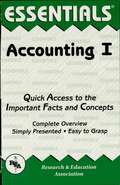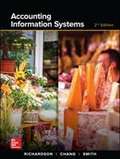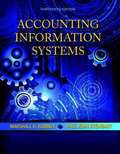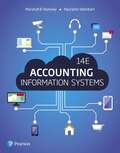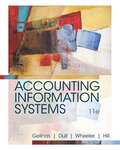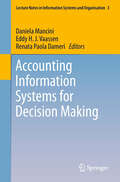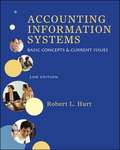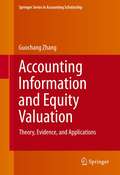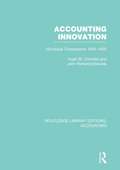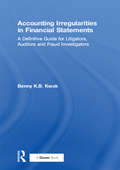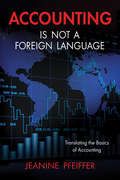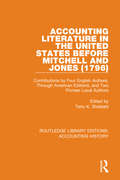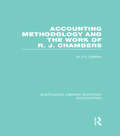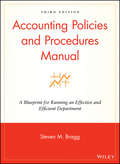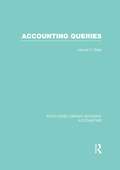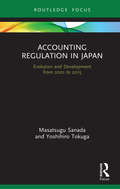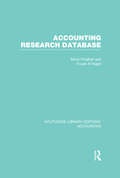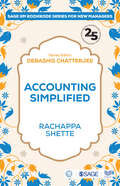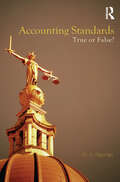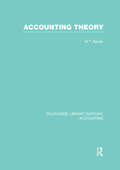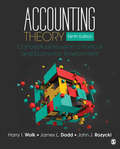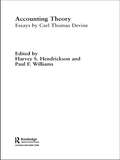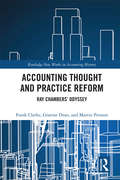- Table View
- List View
Accounting I Essentials
by Duane MilanoREA’s Essentials provide quick and easy access to critical information in a variety of different fields, ranging from the most basic to the most advanced. As its name implies, these concise, comprehensive study guides summarize the essentials of the field covered. Essentials are helpful when preparing for exams, doing homework and will remain a lasting reference source for students, teachers, and professionals. Accounting I includes accounting principles, the accounting cycle, adjusting entries, closing entries, worksheet procedures, accounting for a merchandising operation, internal control and specialized journals, cash, receivables, inventory, property, plants and equipment, and long-term assets.
Accounting Information Systems
by Vernon Richardson Chengyee Janie Chang Rod E. SmithAccounting Information Systems 2e covers the four roles for accountants with respect to information technology: users of technology and information systems, managers of users of technology, designers of information systems, and evaluators of information systems. Accountants must understand the organization and how organizational processes generate information important to management. <p><p> The focus of Accounting Information Systems, 2/e is on the accountant's role as business analyst in solving business problems by database modeling, database design, and business process modeling. Unlike other texts that provide a broad survey of AIS related topics, this text concentrates on developing practical, real-world business analysis skills. Whether you are developing a new course for AIS or incorporating AIS materials into your existing curriculum, Accounting Information Systems, 2/e will help prepare your students for their future careers.
Accounting Information Systems
by Marshall B. Romney Paul John SteinbartFor undergraduate and graduate courses in AIS The market-leading text with the most comprehensive, flexible coverage of AIS available. This market-leading text delivers the most comprehensive and flexible coverage of the our major approaches to teaching AIS, while allowing instructors the flexibility to reorder chapters and focus the material to suit their individual course needs. This new edition has been updated to cover all of the most recent developments in AIS and to show AIS has changed the roles of an accountant.
Accounting Information Systems
by Marshall Romney Paul SteinbartAccounting Information Systems, 14th Edition covers all of the most recent updates in AIS, including how developments in IT affect business processes and controls, the effect of recent regulatory developments on the design and operation of accounting systems, and how accountants can use the AIS to add value to an organization. Not only will readers see how AIS has changed the role of an accountant, but they’ll also be prepared for a successful accounting career in public practice, industry, or government.
Accounting Information Systems
by Patrick Wheeler Ulric J. Gelinas Richard B. Dull Mary Callahan HillAs an accounting professional, you are expected to help organizations identify enterprise risks and provide quality assurance for the company's information systems. <P><P>You can rely on ACCOUNTING INFORMATION SYSTEMS, 11E's clear presentation to help you understand the two issues most critical to accounting information systems in use today: enterprise systems and controls for maintaining those systems. <P><P> ACCOUNTING INFORMATION SYSTEMS, 11E explores today's most intriguing accounting information systems (AIS) topics and details how these issues relate to business processes, information technology, strategic management, security, and internal controls. The authors focus on today's most important advancements, using a conversational tone rather than complex technical language to ensure you develop the solid foundation in AIS that you need to be successful.
Accounting Information Systems for Decision Making (Lecture Notes in Information Systems and Organisation #3)
by Daniela Mancini Renata Paola Dameri Eddy H. VaassenThis book contains a collection of research papers on accounting information systems including their strategic role in decision processes, within and between companies. An accounting system is a complex system composed of a mix of strictly interrelated elements such as data, information, human resources, IT tool, accounting models and procedures. Accounting information systems are often considered the instrument by default for accounting automation. This book aims to sketch a clear picture of the current state of AIS research, including design, acceptance and reliance, value-added decision making, interorganizational links, and process improvements. The contributions in this volume emphasize that AIS has grown into a powerful strategic tool. The book provides evidence for this observation by examining a wide range of current issues ranging from theory development in AIS to practical applications of accounting information systems. In particular it focuses on themes of growing interest in the realm of XBRL and Financial Reporting, Management Information Systems, IT/IS Audit and IT/IS Compliance. The book will be of interest to financial and managerial accountants and IT/IS practitioners, including information systems managers and consultants.
Accounting Information Systems: A Practitioner Emphasis
by Cynthia Heagy Constance LehmannMany AIS textbooks do not explain the basic structure of an entire accounting information system. When students finish this textbook, they will really understand an accounting system. Some books focus more on technology topics than basic accounting system topics. Few accounting graduates will apply for jobs to build databases. Most will be users, auditors, and implementers of accounting systems and need to understand how accounting software works. As a result, this book has a practitioner emphasis, not a systems development emphasis as do many accounting textbooks. Intended to meet the needs of a first course in accounting information systems at either the undergraduate or graduate level, this textbook may also be used as a review text in second or subsequent courses in this area.
Accounting Information Systems: Basic Concepts and Current Issues (2nd Edition)
by Robert HurtHurt's Accounting Information Systems, 2e continues to take a fresh new approach that puts judgment and critical thinking, not technology, at the heart of the AIS course. Using a conversational writing style appealing to students, this book presents AIS as an art as much as a science. AIS is presented as a set of fundamental ideas and concepts that can be applied in various organizational contexts. Students are provided with vocabulary they will need to succeed in the profession and ensuring that they can communicate clearly and effectively about accounting information systems with both accountants and nonaccountants. The text end-of-chapter exercises and assessment tools are all competency-based, distilling knowledge to its essential elements and then encouraging students to use those essential elements to think for themselves.
Accounting Information and Equity Valuation: Theory, Evidence, and Applications (Springer Series in Accounting Scholarship #6)
by Guochang ZhangThe purpose of this book is to offer a more systematic and structured treatment of the research on accounting‐based valuation, with a primary focus on recent theoretical developments and the resulting empirical analyses that recognize the role of accounting information in making managerial decisions. Since its inception, valuation research in accounting has evolved primarily along an "empirically driven" path. In the absence of models constructed specifically to explain this topic, researchers have relied on economic intuition and theories from other disciplines (mainly finance and economics) as a basis for designing empirical analyses and interpreting findings. Although this literature has shed important light on the usefulness of accounting information in capital markets, it is obvious that the lack of a rigorous theoretical framework has hindered the establishment of a systematic and well‐structured literature and made it difficult to probe valuation issues in depth. More recently, however, progress has been made on the theoretical front. The two most prominent frameworks are (i) the "linear information dynamic approach" and (ii) the "real options‐based approach" which recognizes managerial uses of accounting information in the pursuit of value generation. This volume devotes its initial chapters to an evaluation of the models using the linear dynamic approach, and then provides a synthesis of the theoretical studies that adopt the real options approach and the empirical works which draw on them. The book also makes an attempt to revisit and critique existing empirical research (value-relevance and earnings-response studies) within the real options-based framework. It is hoped that the book can heighten interest in integrating theoretical and empirical research in this field, and play a role in helping this literature develop into a more structured and cohesive body of work. Value is of ultimate concern to economic decision-makers, and valuation theory should serve as a platform for studying other accounting topics. The book ends with a call for increased links of other areas of accounting research to valuation theory.
Accounting Innovation: Municipal Corporations 1835-1935 (Routledge Library Editions: Accounting)
by Hugh M. Coombs and John Richard EdwardsThe period 1835-1935 saw the development of the structure of local government which remains broadly intact today and also the growth of modern financial reporting procedures. This book examines the accounting implications of these developments and places them within the social and organisational contexts in which the events took place. The research is based on the contents of government reports, contemporary literature dating from the mid 1870s and the archival records of five municipal corporations – Birmingham, Bradford, Bristol, Cardiff and Manchester.
Accounting Irregularities in Financial Statements: A Definitive Guide for Litigators, Auditors and Fraud Investigators
by Benny K.B. KwokAccounting irregularities are at the heart of those kinds of frauds that hit financial statements and include misstatement, misclassification as well as misrepresentation. In essence, they involve manipulation of accounting data, description or disclosure in order to distort the true financial picture of the organization in question. This book provides an in-depth practical reference, designed for litigators, investigators, auditors, accountants and other professionals who need to understand and combat accounting irregularities and to uphold the integrity of financial statements. Regulators will find this book an essential source of ideas and references when considering reforms. Educators and students will see this book as an alternative, inspiring way of understanding accounting and how to stay alert for accounting irregularities. The first two chapters introduce the basics of accounting irregularities in the context of the financial reporting environments, and generally accepted accounting principles in the UK and Hong Kong. Perpetrators often seek ways to creating financial illusions in four common directions - selling more, costing less, owning more and owing less as discussed in Chapters 3 to 6. The seventh chapter considers various ways that perpetrators manipulate the classification and disclosure of financial statements. Chapter 8 explores three scenarios of accounting irregularities - tax evasion, theft and commercial dispute. The concluding chapter sets out the deterrents to accounting irregularities in two dimensions. At the micro-level, deterrents are implemented within the authority of the organization in question, whilst the macro-level deterrents refer to the external environment beyond the controls of any individual organization.
Accounting Is Not a Foreign Language: Translating the Basics of Accounting (Accounting Is Not A Foreign Language Ser.)
by Jeanine PfeifferA seasoned accountant offers a simple approach to the basics of accounting and shows readers how to make accounting work for them.Does accounting seem to be all Greek to you? Many small business owners have the passion and expertise necessary to run their businesses but keeping journals and tallying accounts can be mystifying. Fear not! In Accounting Is Not a Foreign Language, Jeanine Pfeiffer guides readers through the fundamentals and complexities of accounting, using clear and straightforward terms to explain what all those numbers actually mean.Pfeiffer, an accountant with twenty years of experience in both small and large business accounting and the CEO of Pfeiffers Accounting and Consulting, LLC, offers this book to assist small business owners in keeping accurate and updated accounts and establishing a basic understanding of accounting. From debits and credits to income statements, Pfeiffer demonstrates just how to make accounting work for you, laying a foundation for future growth and profit. Her LINKS approach connects the disparate parts of accounting together in an easy-to-follow manner, helping readers see that in accounting, everything is linked together—linked to the overall business.Filled with helpful resources such as sample journal entries, receipts, and invoices, as well as detailed chapter summaries, Pfeiffer’s clear and matter-of-fact explanations lift the shroud of mystery from small business accounting, revealing a simple step-by-step process to building a better business. After reading Accounting Is Not a Foreign Language, you’ll be speaking the language of accounting fluently—and translating your business accounting into solid profit.Praise for Accounting Is Not a Foreign Language“Finally, a book for all of us non-accountants who have careers in the accounting profession. Simply put, this book makes the complex understandable. It’s a fact that administrative professionals working in the public accounting profession often struggle to understand the technical aspects of what accountants do for their clients. I recommend Accounting Is Not a Foreign Language to all of the marketing, human resources, technology, and other administrative professionals working in the public accounting world. Read this book and just imagine what we could accomplish for our firms if we all spoke the same language.” —Eric Majchrzak, Director of Marketing, Freed Maxick CPAs; Board member of the Association for Accounting Marketing; Named in Accounting Today’s list of the Top 100 Most Influential People
Accounting Literature in the United States Before Mitchell and Jones: Contributions by Four English Authors, Through American Editions, and Two Pioneer Local Authors (Routledge Library Editions: Accounting History #4)
by Terry. K. SheldahlThis book, first published in 1989, reproduces and assesses several key works from the beginnings of the profession of accountancy. The articles featured partly formed the origins of American accountancy, and as such are extremely valuable reference resources for the historian of the profession.
Accounting Methodology and the Work of R. J. Chambers (Routledge Library Editions: Accounting)
by M.j.r. GaffikinThis study traces the development of methodology in philosophy and economics with particular focus on the work of Raymond Chambers. As well as analysing the reception on methodological lines, afforded his work by both academic and professional communities, the volume discusses some significant contributions by French and German scholars to the debate about why scientific communities have accepted some theories and rejected others.
Accounting Policies and Procedures Manual
by Steven M. BraggNow in a fifth edition, Accounting Policies and Procedures Manual: A Blueprint for Running an Effective and Efficient Department is a how-to guide on creating an effective and efficient accounting department policies and procedures manual.Written by Steven Bragg, the foremost authority in accounting and controllership issues, the new edition includes:A new, complimentary Web site providing readers with the foundation for creating or enhancing their accounting department policies and procedures manualMore coverage of accounting procedures including inventory, billing, cash receipts, pricing, order entry, credit, collections, sales returns, capital budgeting, cash forecasting, payroll, and closing the booksAccounting Policies and Procedures Manual is the tool every accounting department needs to regularize and systematize its procedures to match the best in the industry.
Accounting Queries: Accounting: Accounting Queries (Routledge Library Editions: Accounting)
by Harold C. EdeyThese reprints of articles, lectures and talks cover the period 1949 – 1980. They chart the development of the academic subject of accountancy and illustrate some of the matters which were concerning the academics at the London School of Economics at a time when academic accountancy was still in its infancy.
Accounting Regulation in Japan: Evolution and Development from 2001 to 2015 (Routledge Focus on Accounting and Auditing)
by Masatsugu Sanada Yoshihiro TokugaLittle has been published on accounting standards in Japan and how they have developed. The purpose of this study is to construct a historical narrative of the interplay between accounting standards in Japan and theories of regulation. The authors demonstrate that delegation of the authority for accounting standard setting to the private sector in Japan is incomplete, and thus, the role of the public sector remains important. In the discussion about IFRS implementation in Japan, the movement in the United States, industry opinions, and ideological conflict between fair value versus historical cost play important roles. These elements combined led to the ambiguous coexistence of four sets of accounting standards in Japan. First, by using an explaining-outcome process-tracing method, the authors examine how these sets of standards occurred and explore the significance of each. Second, they deliver an explanation of this unique coexistence through the lens of theories of regulation. In doing so, they provide an overview of the history of the recent development of accounting regulation in Japan and offer an up-to-date response to current affairs or policy debates in Japan that have been rapidly changing. Providing a rare insight into accounting regulation in Japan, an IFRS non-application country, this concise text will be of great interest to researchers and advanced students in international accounting and accounting regulation.
Accounting Research Database (Routledge Library Editions: Accounting)
by Bimal Prodhan Fouad Al NajjarAn invaluable tool for the researcher in accounting history, this comprehensive database, structured in an accessible way, analyses over 1,200 articles from four mainstream accounting journals from the UK and USA. Each article (originally published between 1976 and 1985) was analysed in two ways: first, into empirical or conceptual categories and second, into one of twenty topic areas. The journals covered are Journal of Accounting Research, The Accounting Review, Accounting and Business Research and Journal of Business Finance and Accounting.
Accounting Simplified (SAGE IIM-Kozhikode Series for New Managers)
by Rachappa ShetteAccounting Simplified is a manager’s guide to accounting for making effective corporate decisions. The accountant’s lingo consists of difficult language and financial jargons existing in the mainstream literature of finance. Understanding P&Ls, costing, balance sheet, income and cash flows statements for a fresh graduate or a rookie manager from a non-financial background can be challenging, leading to total disinterest in the area or dependency on finance managers or even erroneous decision-making. This book will help managers in understanding the analysis of balance sheet, statement of profit and loss and cash flows statement. It includes case studies of financial statements of major listed companies and checklists to understand the financial health and performance of the organization. The book will help young managers, accounting executives and academicians use accounting insights for improving business performance.
Accounting Standards: True or False?
by R.A. RaymanFollowing a spate of high-profile financial scandals (including Enron, WorldCom, and Parmalat), the quality of financial information has come under increasing scrutiny. Many of the accounting standards being imposed on the profession by regulators and standard-setting bodies are now attracting criticism from the business community and the accountancy profession itself. In this book, Anthony Rayman traces a fundamental flaw in the conventional academic wisdom back to the nineteenth century, and proposes an alternative conceptual framework. He argues that effective corporate governance can be achieved, not by expensive and counterproductive regulations (like the US Sarbanes-Oxley Act and some International Accounting Standards), but by an enhanced accounting information system that exposes corporate management to the full rigour of market forces.
Accounting Theory (Routledge Library Editions: Accounting)
by W. T. BaxterDiscussing various aspects of accounting theory by collecting diverse pieces originally published between 1978 and 1994, this volume asks and answers the following questions: What do the figures from a company’s report actually mean? To what uses can they properly be put? Could they be improved? What effect have they on the outside world?
Accounting Theory: Conceptual Issues in a Political and Economic Environment
by Harry I. Wolk James L. Dodd John J. RozyckiThis updated Ninth Edition of Accounting Theory: Conceptual Issues in a Political and Economic Environment continues to be one of the most relevant and comprehensive texts on accounting theory. Authors Harry I. Wolk, James L. Dodd, John J. Rozycki provide a critical overview of accounting as a whole as well as touch on the financial issues in economic and political contexts, providing readers with an applied understanding of how current United States accounting standards were derived and where we might be headed in the future. Readers will find learning tools such as questions, cases, problems and writing assignments to solidify their understanding of accounting theory and gain new insights into this evolving field.
Accounting Theory: Conceptual Issues in a Political and Economic Environment
by Harry I. Wolk James L. Dodd John J. RozyckiThis updated Ninth Edition of Accounting Theory: Conceptual Issues in a Political and Economic Environment continues to be one of the most relevant and comprehensive texts on accounting theory. Authors Harry I. Wolk, James L. Dodd, John J. Rozycki provide a critical overview of accounting as a whole as well as touch on the financial issues in economic and political contexts, providing readers with an applied understanding of how current United States accounting standards were derived and where we might be headed in the future. Readers will find learning tools such as questions, cases, problems and writing assignments to solidify their understanding of accounting theory and gain new insights into this evolving field.
Accounting Theory: Essays by Carl Thomas Devine (New Works In Accounting History Ser.)
by Harvey S. Hendrickson Paul F. WilliamsOne of the outstanding accounting theoreticians of the twentieth century, Carl Thomas Devine exhibited a breadth and depth of knowledge few in the field of accounting have equalled. This book collects together eight previously unpublished essays on accounting theory written by Professor Devine.Professor Devine passed away in 1998, prior to the sign
Accounting Thought and Practice Reform: Ray Chambers’ Odyssey (Routledge New Works in Accounting History)
by Frank Clarke Graeme William Dean Martin E PerssonRaymond John Chambers was born just over a century ago on 16 November 1917. It is more than fifty years since his first classic, Accounting, Evaluation and Economic Behavior, was published, more than forty since Securities and Obscurities: Reform of the Law of Company Accounts (republished in 1980 as Accounting in Disarray) and over twenty since the unique An Accounting Thesaurus: Five Hundred Years of Accounting. They are drawn upon extensively in this biography of Chambers’ intellectual contributions, as are other of his published works. Importantly, we also analyze archival correspondence not previously examined. While Chambers provided several bibliographical summaries of his work, without the benefits of reviewing and interspersing the text with correspondence materials from the Chambers Archive this study would lack an appreciation of the impact of his early childhood, and nuances related to his practical (including numerous consultancies) and academic experiences. The ‘semi-biographical narrative’ codifies article and editorial length exercises by the authors drawing on parts of the archive related to theory development, measurement and communication. Other parts are also examined. This allows us to respond to those critics who claim his reforms were naive. They further reveal a man of theory and practice, whose theoretical ideas were solidly grounded on observations from his myriad interests and experiences. Many of his practical experiences have not been examined previously. This approach and the first book-length biography differentiates this work from earlier analyses of Chambers’ contribution to the accounting literature. We provide evidence to support the continued push for the reforms he proposed to accepted accounting thought and practice to ensure accounting is the serviceable technology so admired by Pacioli, Da Vinci and many other Renaissance pioneers. It will be of interest to researchers, educators, practitioners and regulators alike.
